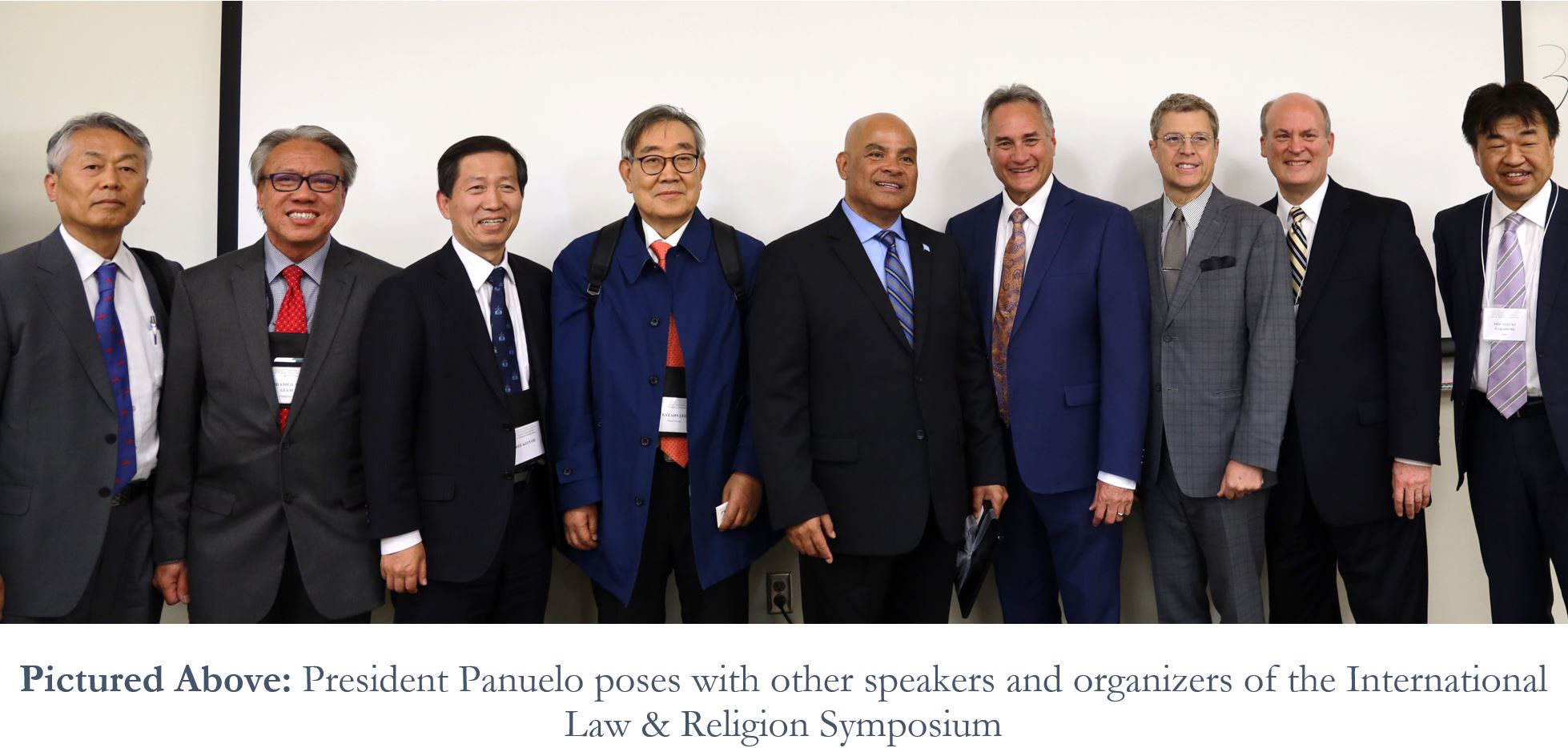
FSM Information Services
Press Release
President Panuelo’s Remarks at the 26th Annual International Law & Religion Symposium: Human Dignity & Religious Freedom—Preventing & Responding to Persecution
PROVO—On October 7th 2019, His Excellency David W. Panuelo, President of the Federated States of Micronesia, presented remarks at the 26th Annual International Law & Religion Symposium. The theme of the symposium was on Human Dignity & Religious Freedom: Preventing & Responding to Persecution. The President received the invitation to speak when he was a Senator in the Congress of the FSM, and held onto the commitment after his election as the ninth President of the Nation.
Below are the President’s remarks, as prepared.
--------
Ladies & Gentlemen,
It’s great to be here amongst friends and colleagues at the 26th Annual International Law & Religion Symposium. We’ve just finished the 74th United Nations General Assembly in New York and the 50th Pacific Islands Forum in Tuvalu, where climate change was the central theme for both. Soon we’ll be headed to Washington, D.C. to meet with officials in the U.S. Government to discuss numerous issues of mutual interest, to include veterans’ healthcare review and reform for Micronesians, recent announcements by the U.S. Department of Homeland Security, and plans to move forward on the negotiations of the expiring provisions of the Compact of Free Association, the treaty that codifies our country’s enduring relationship with the United States. So, it’s really a great honor and privilege to be invited to speak here today on Human Dignity and Religious Freedom: Preventing & Responding to Persecution.
I’d like to thank Brigham Young University and the International Center for Law & Religious Studies for championing their mission to help secure the rights of freedom of thought, conscience, and religion for all people in all places. It’s an honor to be able to participate in this symposium which has become a principal gathering place for global discussions on law and religion.
As the Universal Declaration of Human Rights, which has been ratified by the United States and is abided by the Federated States of Micronesia, says: “…it is essential, if man is not to be compelled to have recourse, as a last resort, to rebellion against tyranny and oppression, that human rights should be protected by the rule of law….” Religious discrimination, as one of the principal types of discrimination that people suffer around the world, must be highlighted as a global issue, and treated with the same respect as discrimination based on economic class, ethnicity, gender, and so forth. In this respect, I submit to you that it is of the utmost importance that religious identity, in its various forms, must be protected by law.
Before I continue on, I would like to express my amazement at how beautiful the State of Utah is. I sense that the communities here are more in touch with nature than many communities, which, like the Federated States of Micronesia, is fortunate to be blessed with clean air and water, and majestic mountains. For centuries, our sustenance-based relationship with our land and ocean has been our form of livelihood: our environment is our life. At the Climate Action Summit held during the 74th General Assembly of the United Nations, Secretary-General Guterres said “We fool ourselves if we think we can fool nature…if we don’t urgently change our ways of life, we jeopardize life itself.”
I mention this not only because protecting the environment is so important to my country and its people, including me personally, but because it’s my view that in the broader spirit of protecting human dignity and preventing persecution that we owe it to each other to think of our environment as an extension of humanity. In other words, a clean and sustainable environment is a healthy and sustainable society.
I self-identify as a Catholic, and faith has guided many of my actions in public service—but I must make clear at the forefront that I am not an expert in religion. I am merely a human being who believes very deeply in respecting others and respecting oneself, and in showing love and kindness to all at all times.
In my Inaugural Address as the ninth President of the Federated States of Micronesia, I said that I would ensure the FSM National Government is transparent, responsible, and accountable, with the rule of law being of paramount importance in all that we do in service to our citizens. Our Constitution guarantees freedom of religion; it would be fair to say that the freedom of religion, then, and the rule of law are symbiotic. You cannot have one without the other.
The FSM strongly encourages tolerance, though we also recognize the possible corrosive and destructive effects of extremism. The rule of Law has to be able to overcome these extremes. Law cannot just be words written on paper; they must be principles that we live by, and that leaders uphold and actively protect.
I trust that most of you here, perhaps all of you, would agree with the assertion that every religion includes, at its foundation, a set of core values and rules for people to abide by. We all look to our faith for Guidance, and while there may be disagreements among people and among States at times on what that Guidance is, and how it should manifest, we can agree that rules and standards are far more preferable to the alternative.
Humankind must serve beneath the Law and be guided by the influence of faith—in religion or in philosophy—if we are to prosper. Because when a man thinks he is above God, or when a man thinks he is above the Law, he becomes lost. He becomes, at best, astray and confused. And he becomes, at worst, a dictator with little regard for human dignity. In other words, we are all subservient to our faith and to the Law.
As the United Nations’ Secretary-General, Antonio Guterres, said: “One thing that particularly concerns me…is the trust deficit between nations. …Transparency, dialogue, and greater understanding are essential to alleviating mistrust. …We need more intense cooperation with other international and regional organizations…We need an inclusive multilateralism.” What we’re doing here at this symposium is part of the global effort to build and strengthen trust and that inclusive multilateralism the Secretary-General refers to.
I don't need to travel far to tell you that Micronesians know what it looks like when a man thinks he is above faith, and thus above the Law.
Long ago--anthropologists and archaeologists would tell you perhaps five hundred to a thousand years ago--there lived a man named Saudeleur, who reigned over Nan Madol, present-day Pohnpei's UNESCO World Heritage Site. Saudeleur thought himself to be above faith, and above the rule of Law.
Over time in a story I can tell another day, the structure of our cultural and traditional leadership transformed from one of social subservience to tyranny, to one of power-sharing. In my native Pohnpei, this is what gave us our current traditional leadership structure and the broad idea of power-sharing, which is applicable across my country today.
Ladies and Gentlemen, I suggest to you again that our culture of respect is sustained by the principles that power is shared and subservient to the Law, and that humility is maintained by our respect and recognition of the importance of faith and the freedom of religion.
The FSM States of Yap, Chuuk, Pohnpei, and Kosrae have always been accepting of other religions. I mentioned I self-identify as a Catholic, and just as I'm not a theologian I'm also not a historian. But I suspect the Spanish Catholic missionaries from the 1800s may have played a role in my belief structure, as they are the ones who introduced the Catholic religionto our islands.
In the span of our colonial history, we welcomed the Spanish, the Germans, and the Japanese, and of course we have welcomed the Americans, our first and foremost ally, to our shores. I think it speaks volumes of our Nation that, as a Micronesian and as a Catholic that I can have friends like Bill Davis, who is an Elder of the Church of Jesus Christ of Latter-Day Saints; Serjeel Ahmed, who is an Imam in the Ahmadiyya branch of Islam living in Pohnpei; and Yosiwo P. George, our Nation’s Vice President and a Pastor in the Protestant church.
While the daily realities of life can often bring uncertainties, there is tremendous, profound, and powerful comfort in the knowledge that the Law guides us in the secular world, Religion and faith guide us in the spiritual world, and friendship and respect bridge these two worlds together. I have told the citizens of the Federated States of Micronesia that, as their President and as their Public Servant, I will uphold the rule of law. I will do that, which is why all of you—regardless of your religious beliefs—are welcome to visit our home. We will treat you like family.
It always strikes me as fascinating that, around the world, countries and cultures consider themselves to be blessed. I have read and heard that the United States of America is, at times, called God's Country. I have read and I have heard that New Zealand is, at times, called God’s Own.
My native Pohnpei means Upon a Stone Altar, referring to the island as being a religious place. And in the southernmost part of Pohnpei State is the island of Kapingamarangi, which means, in their language, Gateway to Heaven. Across the world, our homes are named after our aspiration for spiritual guidance.
In times and places when man thinks he is above the Law and above Religion, he might craft together a narrative to say that OUR country is the country for the chosen, and that your country is, by necessity, not. Saudeleur, our ancient leader I referred to, was confident, after all, that his kingdom and his reign were the pinnacle of all things.
Ladies and Gentlemen, I suggest to you that, in fact, every single one of us is blessed, that every single one of us is chosen, and that every tree, every bush and every living thing is beautiful and is part of creation. Speaking for myself, it's because of my faith in my religion and my faith and duty to the people of the Federated States of Micronesia that I believe we must show respect to each other, yes, of course, but also to our environment. We believe every country is part of God’s Kingdom, and therefore everywhere on Earth—not just churches—is part of His Domain.
I am privileged to serve the Lord by serving my people, and I recognize that I am where I am today because I was deeply loved by those around me to include, I believe, the Lord Himself. And so, Ladies and Gentlemen, in closing I would like to ask each and every one of you to show each other true love and genuine respect for one another.
Respect overcomes tyranny. Compassion and sincere appreciation for other human beings is how we acknowledge our service to our Law and to our faith.
As Micronesians, we extend to you, and all nations, what we seek from each: peace, friendship, cooperation, and love in our common humanity.
Thank you all for the privilege of being part of this symposium, and for allowing me to speak. I give a very special thank you to my friends, Elder Gerrit Gong and Elder Bill Davis, and the Church of Jesus Christ of Latter-Day Saints, for your invitation and your kindhearted contributions and your presence in our Blue Pacific Continent, our Pacific Island countries.

